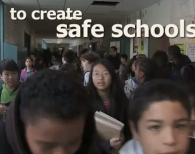This week's broadcast of Anderson Cooper's special report: "Bullying: It Stops Here" on CNN and Lady Gaga's recent announcement that she will go to the U.S. president to address the bullying problem has brought bullying onto the national agenda.
But solutions are out there. Across the country, students and teachers are sharing stories, joining together and taking action to create safe schools, free from stereotypes, intolerance, and hate. They're part of a movement called Not In Our School.
Here are three short videos that introduce you to the breadth of student and teacher-led movements.
What is Not In Our School?
Students Map Bully Zones to Create a Safer School
Bullying
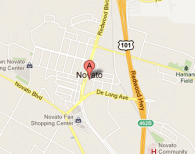
As hate infiltrated the Northern California town of Novato when an Asian man was stabbed at a local supermarket, residents not only stood by the victim’s side—several grocery clerks chased down the assailant.
The residents’ heroic response was documented in Not In Out Town II, and has left a lasting impression of a community that comes together in times of trouble.
Since then, “trouble” has revisited Novato, and it has several faces: First, an ongoing debate over high-density affordable housing and increased crime prompted one local newspaper to dub Novato the “City of Rage” and has left a divisive tone at city hall as well as within the community.
But when anti-immigration activist Jerome Ghigliotti was arrested for disturbing a city council meeting after the council refused to put a measure requiring Novato contractors to E-Verify the legal status of employees on the ballot, underlying tensions became palpable.
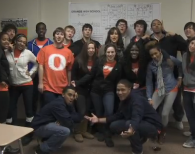
"Every time I see someone get bullied, I step in. No matter what age they are, if I know them or not, it doesn't matter." —Orange High School student
Today, we feature one of our newest Not In Our School videos. In this film, students from Orange High School in Pepper Pike, Ohio, identify bully zones around their campus and stage a flash mob performance in their cafeteria to highlight bullying they've witnessed: verbal, physical and cyberbullying.
To find out more about the Not In Our School initiative visit NotInOurSchool.org. For more free videos of students and teachers creating safer school environments visit NotInOurSchool.org/videos.
This video is also available on Teacher Tube.
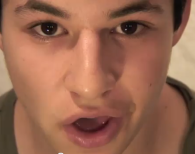
The Not In Our Town crew had the pleasure of interviewing young performing artist Julian Hornik a few years ago during Palo Alto Unified School District's Not In Our School week. He told us about the bullying and cyberbullying that he experienced after classmates discovered YouTube videos of Julian performing his original songs. Now 15, Julian sends a message to other teens: "It Gets Better." Julian states:
I wrote this song in hopes that gay teens who are thinking of harming themselves might think twice. There will come a time when the idea of tormenting someone because he or she is gay will seem as absurd as segregation does today. In the mean time, the world is getting younger and smarter and more accepting. And it will get better.
Julian is also offering this song via iTunes with all proceeds to benefit the Trevor Project. Visit Julian at http://julianhornik.typepad.com/. Here is Julian performing this song:
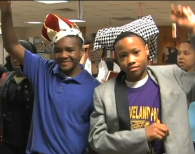
It's Day 4 of No Name-Calling Week. Today we are sharing one of our most popular Not In Our School videos, "Students Teach Students to Stand Up to Bullying," filmed at Shaw High School in East Cleveland, Ohio.
Students in Lori Urogody-Eiler's Facing History and Ourselves class mentor younger students in how to be an upstander, not a bystander, when faced with bullying and intolerant acts. This version was included in our MLK-inspired collection, Embracing the Dream: Lessons from the Not In Our Town Movement, and is preceded by a short clip featuring Not In Our Town Billings chair Eran Thompson.
For more information, our education partners at Facing History and Ourselves offer classroom resources on Bullying and Ostracism.
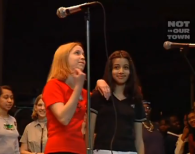
On this third day of No Name-Calling Week, we showcase two videos of middle school students who use skits to stand up against bullying and promote acceptance in their schools. The first is a Not In Our Town video from Rockford, Illinois where student council members organized a Not In Our School campaign and a school wide assembly with student-produced skits challenging stereotypes and other intolerant behavior.
Like the students at West Middle School, these students from Tom Harpool Middle School in Argyle, Texas created this video to stand up against bullying as a part of their Destination Imagination program.
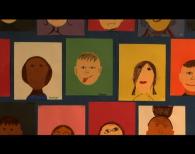
Yesterday, when we posted about the first day of No Name-Calling Week on the NIOT Facebook page, one of our Facebook fans said bullying in schools seems to be rising, while another noted the important role adults play in being models of acceptance.
As schools and organizations discuss name-calling this week, here are two interesting perspectives. The first is the preview for Let's Get Real, a film from Groundspark, that features students speaking in their own voices about their name-calling experiences. The second, below the video, comes from our archives, in which a father grapples with the name-calling of his 9-year-old son.
Welcome to the No Name-Calling Week page. Here you'll find all of our blog posts, in descending order, related to our participation with this weeklong activity sponsored by GLSEN in 2011.
Jan. 28, 2011
The Not In Our Town crew had the pleasure of interviewing young performing artist Julian Hornik a few years ago during Palo Alto Unified School District's Not In Our School week. He told us about the bullying and cyberbullying that he experienced after classmates discovered YouTube videos of Julian performing his original songs. Now 15, Julian sends a message to other teens: "It Gets Better." Julian states:
I wrote this song in hopes that gay teens who are thinking of harming themselves might think twice. There will come a time when the idea of tormenting someone because he or she is gay will seem as absurd as segregation does today. In the mean time, the world is getting younger and smarter and more accepting. And it will get better.
